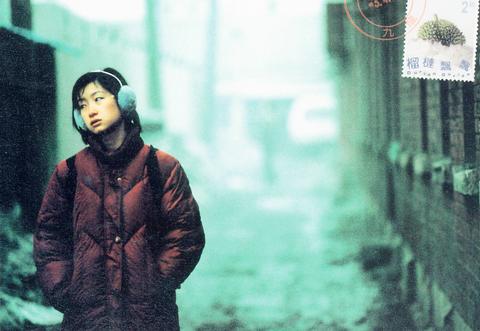Fruit Chan (陳果) is good at presenting vivid images of Hong Kong street life, but he extends his range in Durian Durian, winner of a shelf of prizes at this year's Golden Horse Awards, including Best Picture and Best Actress.
Yen (Qin Hailu,

PHOTO COURTESY OF GROUP POWER WORKSHOP
She acts cool, tapping her high-heels through the city's narrow lanes at night, shuffling through one love hotel after another. During the day she waits at a crowded tea restaurant, barely finishing her lunch box before being called to another customer. Then she walks back to her small shack in the lanes. Her dream of seeing the glittering view of Hong Kong harbor at night remains only a wish. She gazes instead at a picture of the famous skyline from a calendar on her wall.
Fan (Mak Wai-fan,
The two girls' different worlds meet when Yen's pimp is hit by a durian fruit, which comes to symbolize the friendship between the two women. Like Yen, Fan is a drifter too. The only difference being that Fan drifts from one family member to another, while Yen drifts alone.
There is a touching, if not classic, scene in which Fan's family shares a durian in their dank apartment. The father introduces the durian, the so-called king of fruits, to the family. "Oh, it smells. I'm not gonna eat it!" says one family member. "It is very sweet and it's rare and expensive. Just one bite, you'll see!" the father says. As the family gabs over whether or not to eat it, the camera rolls slowly back to Fan, reluctantly trying a bite. An unusually long take, the scene captures the warmth of Fan's humble, bittersweet family life, just as it's shown in her face while trying the smelly durian.
The fruit also serves as a metaphor for the Hong Kong the two girls live in. It's a land of gold, but it's also as dirty, alienating and noxious as the fruit.
Later the camera takes you to Yen's homeland, Manchuria. The northern China in Chan's lens is more human than Hong Kong, but Yen's memories of the place seem distant at best. The people there are poor, but they have high hopes. All to often they have false dreams about making money in the south. Yen throws a feast to treat her neighbors. She acts cool and proud. But she is no longer the girl with the dream of a beautiful future. Instead, she's become alienated from her familiar snowy homeland. One day, she receives a gift from Fan, a big, pungent durian. The smell reminds her of the days down south.
Chan presents contrasts not only between the north and south, but also within Yen who strives for a beautiful existence through squalid means.
As a new actress, Qin shows multiple layers in her talent in a calm, undramatic way. Her turn as Yen fits well with the film's light, sentimental tone.

June 2 to June 8 Taiwan’s woodcutters believe that if they see even one speck of red in their cooked rice, no matter how small, an accident is going to happen. Peng Chin-tian (彭錦田) swears that this has proven to be true at every stop during his decades-long career in the logging industry. Along with mining, timber harvesting was once considered the most dangerous profession in Taiwan. Not only were mishaps common during all stages of processing, it was difficult to transport the injured to get medical treatment. Many died during the arduous journey. Peng recounts some of his accidents in

“Why does Taiwan identity decline?”a group of researchers lead by University of Nevada political scientist Austin Wang (王宏恩) asked in a recent paper. After all, it is not difficult to explain the rise in Taiwanese identity after the early 1990s. But no model predicted its decline during the 2016-2018 period, they say. After testing various alternative explanations, Wang et al argue that the fall-off in Taiwanese identity during that period is related to voter hedging based on the performance of the Democratic Progressive Party (DPP). Since the DPP is perceived as the guardian of Taiwan identity, when it performs well,

A short walk beneath the dense Amazon canopy, the forest abruptly opens up. Fallen logs are rotting, the trees grow sparser and the temperature rises in places sunlight hits the ground. This is what 24 years of severe drought looks like in the world’s largest rainforest. But this patch of degraded forest, about the size of a soccer field, is a scientific experiment. Launched in 2000 by Brazilian and British scientists, Esecaflor — short for “Forest Drought Study Project” in Portuguese — set out to simulate a future in which the changing climate could deplete the Amazon of rainfall. It is

The Taiwan People’s Party (TPP) on May 18 held a rally in Taichung to mark the anniversary of President William Lai’s (賴清德) inauguration on May 20. The title of the rally could be loosely translated to “May 18 recall fraudulent goods” (518退貨ㄌㄨㄚˋ!). Unlike in English, where the terms are the same, “recall” (退貨) in this context refers to product recalls due to damaged, defective or fraudulent merchandise, not the political recalls (罷免) currently dominating the headlines. I attended the rally to determine if the impression was correct that the TPP under party Chairman Huang Kuo-Chang (黃國昌) had little of a